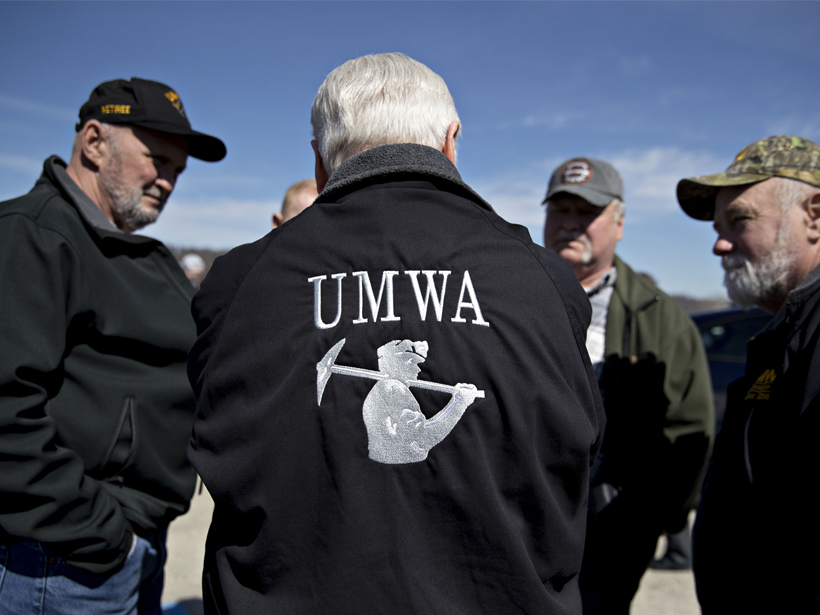
Cecil Roberts doesn’t have a beef about climate science and the need to do something about climate change. However, Roberts, president of the United Mine Workers of America (UMWA), does have a big beef about proposals to curb climate change that he says would cut well-paying American jobs in the coal mining industry. He also insists that no matter what the United States does to reduce or eliminate coal production and mining jobs in this country, it won’t make a dent in the amount of coal use in China and other parts of the world.
The United Mine Workers union “has never challenged the science regarding greenhouse gas emissions and man-made climate change. It is happening, and the world must address it.”
“The UMWA has never challenged the science regarding greenhouse gas emissions and man-made climate change. It is happening, and the world must address it,” Roberts said in a recent speech in Washington, D.C. “We have long supported an economy-wide program to reduce CO2 [carbon dioxide] emissions, covering all major sectors of emissions—transportation, utilities, and industrial. We support global efforts to reduce greenhouse gas emissions, and believe it is short-sighted for the United States to isolate itself from international climate negotiations.”
Following his speech, Roberts told Eos that he disagrees with President Donald Trump, who has referred to climate change as a Chinese hoax. “I don’t agree that climate change is a hoax,” Roberts said. “Most people in the country, most people in the world believe there’s such a thing as climate change. We see that every day with what’s been going on in the Bahamas [with Hurricane Dorian] and other places around the world. Something is happening and the scientists tell us it’s climate change.”
“What we need to do is, OK, it’s happening, now how do we deal with it?” he continued. “The debate that we are having here, the disagreement that we have is how do you deal with it? We think we’re smart enough to deal with this without putting everybody in the country out of a job.”
Looking for a Middle Ground
“We strongly believe that there must be a way to find a middle ground in the climate discussions.”
“We strongly believe that there must be a way to find a middle ground in the climate discussions,” Roberts added in his speech at the National Press Club earlier this month. “The proponents of climate action who have taken extreme positions such as the elimination of all fossil fuel use within a decade, or even two decades, either ignore or do not understand the severe level of dislocation in the economy that would result.”
For Roberts, a middle ground includes supporting carbon capture and storage (CCS) technology that removes carbon from coal plant smokestacks. He called CCS “the only real solution to seriously addressing global climate change.” Roberts said that his union supported the American Clean Energy and Security Act of 2009, the so-called Waxman-Markey climate change bill that if it had become law, would have invested heavily in “clean coal” technology and removing carbon.
Roberts told Eos that in addition to supporting CCS, the United States “ought to be investing heavily in all kinds of research and developing any kind of technology that will allow us to burn this fuel [coal] that we have an abundance of.”
In his speech, however, Roberts expressed concern about carbon tax legislation. “The impact of a carbon tax is sudden death for coal,” he said. “It means immediate job losses as utilities switch from coal to gas and renewables.”
Addressing Climate Change Globally
Although coal is on the decline in the United States, with the 289 coal-fired power plants shut down since 2019 representing 40% of the nation’s coal power capacity, the world still heavily relies on coal, he noted.
According to Roberts, currently, there are 2,000 existing coal-fired plants around the world with another 1,600 under construction. Last year, he said, the world consumed about 7.5 billion tons of coal, with about 691 million tons of that used in the United States to generate electricity. China, he added, has nearly 5 million coal miners compared with 52,000 in the United States.
“Eliminating coal jobs in America does not eliminate the global coal use.”
“It’s time we talk about how to address climate change in a way that will actually have a global effect and not just serve to put American coal miners out of work while doing nothing to actually reduce greenhouse gas emissions worldwide,” Roberts said. “Eliminating coal jobs in America does not eliminate the global coal use. All we are really doing is transferring more production overseas, which will be done by poorly paid workers with little or no safety protections.”
Roberts said his union stands ready to assist in the development of climate legislation “that advances technology, protects workers and their communities, and moves the nation forward on an aggressive course of carbon mitigation while ensuring electric reliability.”
However, he said the union “will not sit quietly and watch our members, their families, and their communities be destroyed in the process. There is a way forward here that can accomplish the twin goals of maintaining good jobs for our members and their families and getting the reductions in greenhouse gas emissions the world needs.”
—Randy Showstack (@RandyShowstack), Staff Writer
This story is part of Covering Climate Now, a global collaboration of more than 250 news outlets to strengthen coverage of the climate story.
Citation:
Showstack, R. (2019), Union leader talks coal and climate, Eos, 100, https://doi.org/10.1029/2019EO133471. Published on 18 September 2019.
Text © 2019. AGU. CC BY-NC-ND 3.0
Except where otherwise noted, images are subject to copyright. Any reuse without express permission from the copyright owner is prohibited.
Text © 2019. AGU. CC BY-NC-ND 3.0
Except where otherwise noted, images are subject to copyright. Any reuse without express permission from the copyright owner is prohibited.

